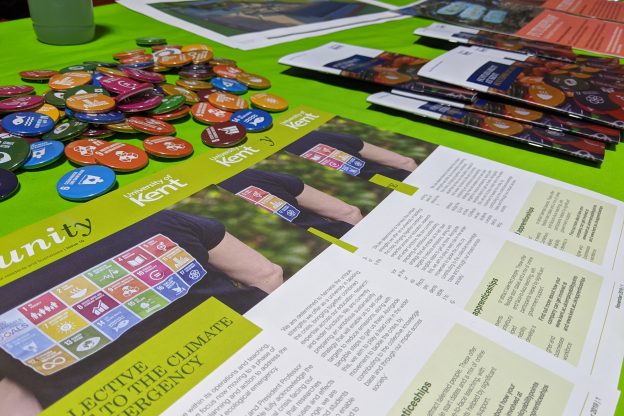In the run up to International Women’s Day, our Careers and Employability Service invite you to be inspired and motivated by women in all kinds of jobs, to help you succeed in your chosen field.
International Women’s Day is celebrated on 8 March this year, and strives to bring people together to end bias, stereotypes and discrimination, working towards a world that’s diverse, equitable, and inclusive. The theme for 2022 is to #BreakTheBias.
We want to be part of the international mission ‘to forge inclusive work cultures where women’s careers thrive and their achievements are celebrated’, and so our Careers and Employability Service have put together a fantastic programme of in person and online events called ‘Inspiring Women Week’, open to all students at all stages, from 28 February to 4 March – see below for details and to book your place.
What’s on at Kent? Inspiring Women Week events:
BOOK NOW: Women breaking into tech: In conversation with Sparta Global on Monday 28 February 13.00-14.00 (online).
Technology needs more diversity, women are still severely under-represented in the digital sector. Join Sparta Global, an award-wining tech company focussed on diversity, for an informal conversation on how to land your dream digital role and become the next female role model.
BOOK NOW: ASPIRE: Female Founders on Tuesday 1 March 13.00-14.00 (online).
Three inspirational women share their experiences of starting and running their own business, giving their tips for getting started, and keeping going.
BOOK NOW: #IamRemarkable on Tuesday 1 March 14.00-15.30 (online).
#IamRemarkable is a Google initiative empowering women and underrepresented groups to speak openly about their accomplishments in the workplace and beyond, thereby breaking modesty norms and glass ceilings. In this interactive session, you will participate in group discussions and exercises to develop the confidence and skills to promote yourself effectively.
BOOK NOW: #BreaktheBias: Leading Change on Wednesday 2 March 13.00-14.00 (online).
Swale Borough Council is celebrating Leading Change this International Women’s Day with your opportunity to find out more about roles in conservation, climate change and local government’s role in tackling this monumental challenge, with many inspiring women discussing their experiences in both the public and private sector.
BOOK NOW: In conversation with Professor Christina Hughes: Building your network on Wednesday 2 March 16.30-17.30
Join Lara Cavill (Employer Engagement & Events Officer) in conversation with Christina Hughes, Honorary Professor and former Interim Deputy Vice-Chancellor (Education and Student Experience) at the University of Kent and Founder and CEO of Women-Space, as they discuss overcoming the nervousness of networking to build a community of mutual support and opportunity; LinkedIn etiquette and how to “quietly network” in your organisation.
BOOK NOW: Overcoming shyness & imposter syndrome on Thursday 3 March 13.00-14.00.
Join Sam Fairbrother as she shares her career cringes, little wins, fails and triumphs. She will take you on her journey from studying, to interning, to finding a job, and now starting her own business.
BOOK NOW: The Female Entrepreneur: Victoria Rowley, Puddle Ducks on Friday 4 March 12.00-13.00 (online).
Victoria Rowley, owner of Puddle Ducks East Kent, North Kent & SE London will share her career journey from swimming instructor to owner of a successful franchise business. She will talk about what she has learnt as youngest franchisee across the Puddle Ducks network, top tips on running a business and how she kept her business afloat during the pandemic.
BOOK NOW: Shy Girl to Leading Woman – How Imperfection Can be Our Strongest Ally on Friday 4 March 14.00-15.00.
It is time to turn imposter syndrome on its head and discover how your own imperfections can be your strongest ally. Join Kent alum, Kinga, a 25-year-old international marketing agency founder, in a light-hearted discussion about her journey from being a timid shy girl, to doing all things possible at university to prove she’s good enough, to working for travel expenses alongside companies like Microsoft and NASA, to finding her business and working with billionaires and global entrepreneurs.
For the full programme and additional resources visit the Inspiring Women Week page.
More for International Women’s Day:
To see more online events taking place around the globe which you can join, take a look at the International Women’s Day Events online.
More to help your employability journey at Kent:
For more information on developing your employability skills, planning your career, improving your CV and practice interviews, check out the Careers and Employability Service website, where you can book 1:1 appointments with careers advisers and useful workshops. To stay up to date with the latest from the Careers Service, follow @UniKentEmploy.
Written by Natalia Crisanti, Student Services, 23.02.22









